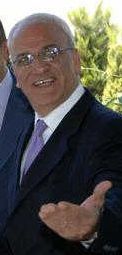Everything you need to know about today’s media coverage of Israel.
News & Commentary
• The Jerusalem Post obtained a document sent to Israeli envoys abroad spelling out some of the legal problems Palestinian statehood faces. It’s an important story; I expanded on but one of the points raised: Who is A Palestinian Citizen?

• Ofcom (pdf format) released its findings on Al-Jazeera’s PaliLeaks coverage. The investigation was at the PLO’s request, and Al-Jazeera comes out clean. Ofcom’s bottom line:
The part played by Dr Erakat and the PLO was an important element of that process, and the documents obtained from Dr Erakat’s office were clearly important and useful in informing viewers’ understanding of their part in the peace process. In these circumstances, even to the extent that Dr Erakat’s and the PLO’s expectations of privacy were engaged, Ofcom took the view that the public interest outweighed this expectation and considered that the obtaining and use of the material was warranted.
Ofcom therefore found that there was no unwarranted infringement of Dr Erakat’s privacy or that of the PLO in the making or the broadcast of the programme.
Of coures, Al Jazeera’s crowing vindication. And the head of the AJ’s “transparency unit,” Clayton Swisher, takes to The Guardian (CiF section) to do the same. The leaks from earlier this year exposed a Palestinian honesty gap.
• Get a load of the this prejudiced description of Elliott Abrams in the Financial Times (click via Google News). Keep in mind that this is from a news story:
“There are ways for Congress to express its displeasure that don’t involve cutting off aid,” says Elliott Abrams, a Middle East adviser in the Bush administration and a leading conservative voice against the Palestinians.
• David Miliband follows up on yesterday’s Daily Telegraph Gaza dispatch with his own commentary in The Guardian‘s CiF section. The former foreign minister is critical of Israel, but his tone is nowhere near as vitriolic as Riddell.
• Yoram Ettinger (Israel HaYom) weighs in on Israel-US relations.
• The Mahmoud Abbas Latin American Tour ’11 rolls on. The LA Times reports on stops in Columbia, El Salvador, Mexico . . .
Arab Spring
 • Staff-eds in the Washington Post and The Australian denounce the Egyptian junta’s handling of sectarian violence and the rising influence of Islamic elements. And Bret Stephens (WSJ via Google News) points out the government can’t blame the Jews for this one:
• Staff-eds in the Washington Post and The Australian denounce the Egyptian junta’s handling of sectarian violence and the rising influence of Islamic elements. And Bret Stephens (WSJ via Google News) points out the government can’t blame the Jews for this one:
Gone is Mr. Sharaf’s narrative, a popular staple when Hosni Mubarak was still in power, of a united Egyptian nation undercut by the sinister meddling of outside forces. Gone as well is the Arab Spring narrative of tech-savvy, pro-democracy protesters standing tall and proud against the dinosaur Mubarak regime. Gone even is the narrative of the liberal secularists versus the Muslim Brotherhood.
Instead, picture Egypt as a vacant lot in which a dozen or so combustible elements—a leaking oil can here; some dry wood over there; patches of desiccated grass—sit in varying degrees of proximity to one another, while the boys who play in the lot light cigarettes. Chances are, something will catch fire. Chances are that if something does, all of it will.
• Yitzchok Adlerstein (LA Times op-ed) slams Egypt for blocking the export of palm fronds to Israel. Is the Egyptian Ministry of Agriculture the Grinch that stole Sukkot?
Only hatred and spite could move a government to act so irrationally and counterproductively.
On a related note, Gaza farmers tell Al Jazeera that the Hamas ban on lulav exports to Israel is political. The farmers say the infection hit just one plantation and all the affected trees were destroyed. So is it blight or spite?
• A NY Times staff-ed slams Security Council’s paralysis over Syria. The NYT also reports that the Syrian economy’s “buckling” under the weight of economic sanctions:
With Syria’s currency weakening, its recession expanding, its tourism industry wrecked and international sanctions affecting most essential sectors, the International Monetary Fund now expects Syria’s economy to shrink this year, by at least 2 percent.
Rest O’ the Roundup
• Wafa News: Hamas raided the offices of the Palestinian Journalists Syndicate.
• I don’t know how this headline got by BBC copy editors who have issues with a certain word that start with a T and rhymes with error. At least they remembered how to spell the T-word correctly:

• Emma Hurd (Sky News) looks at secular-religious tensions in Jerusalem. I’m not sure Hurd really understands the nuances between the religious and non-religious populations of Israel.
• Since 9/11, the value of Israeli security exports have risen from $2 billion a year to $7 billion a year. More at UPI.

